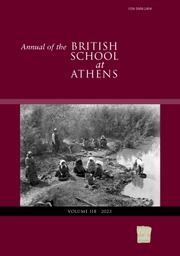Article contents
Supplementary Notes on British Museum Manuscripts Relating to Levantine Geography1
Published online by Cambridge University Press: 18 October 2013
Extract
To some additional notes on this series I have appended the accounts of Chios given in the three unpublished Isolarii, as samples of their style and scope. Chios is chosen as being the native island of Lupaz-zolo, the most important of the three authors.
- Type
- Research Article
- Information
- Copyright
- Copyright © The Council, British School at Athens 1907
Footnotes
See B.S.A. xii. 196 ff.
References
page 339 note 2 To the list of authors of Isolarii given on p. 197, note (2), should be added the names of G. C. Solis (1596), Coronelli, and Laudivius da Vezzano, whose Geographia Insularum (c. 1475) dedicated to Cardinal Ammanati of Pavia is mentioned in his letter on the fall of Caffa, (Giorn. Ligustico, ii. 1875, 137 ff.).Google Scholar No MS. seems to be extant. The island maps in Rosaccio's Viaggio are derived from an earlier (c. 1571) series by G. F. Camocio (B.M. Maps, S. 132).
page 339 note 3 That this was a volcanic occurrence, and not (as Fouqueacuteé, Santorin, p. 11, Philippson, , Thera, i. 66 Google Scholar) a mere landslip, seems to me clear from Pii ii. Commentarii (Francfort, 1614), p. 29. ‘Turn quoque [at the time of an earthquake at Naples] & in Egeo pelago insula emersit, nunquam antea visa; parva circuitu, verum alta supra aquas quadraginta cubitis: arsitque diebus aliquot donee flammae defuit bitumen.’ The occurrence is elsewhere commemorated only by the ambiguous contemporary inscription at Scaros (Ross, Inseln 201, Pégues, Santorin, 138) and the note in a MS. of Buondelmonti dated 1465 ‘hie ab annis VIII. circa nata est insula in longitudine unius galee videlicet in 1458’ (Thera i. p. 6).
page 340 note 1 Sic.
page 340 note 2 Sic.
page 341 note 1 Shewn by the map in Julius E II. to be the name given to the southern mole of the harbour.
page 341 note 2 Since writing the above I find in Giustiniani's, M. Scio Sacra (Avellino, 1658, pp. 4, 18)Google Scholar two references to a Relalione mandata alla Sacra Congregatione della Propaganda Fede nell' ano 1639 sopra la Visita dell' Arcipelago by Francesco Luppazzolo (sic) da Monferrato. The first of these references contains a quotation which suggests that this Relatione was the MS. mentioned by Thevenot (ed. of Amsterdam, 1727, i. 307) as the source of his information on the Chiote villages.
page 342 note 1 Sic.
page 343 note 1 Altered from 28.
page 344 note 1 Sic.
page 345 note 1 Cf. B.S.A. xii. p. 209, note (1).
page 345 note 2 On his outward route he touched at Ceos (Geo) and an unnamed island near by, where he made a piratical descent and was captured. He was taken thence as a prisoner to Negropont, and so overland to Constantinople.
page 346 note 1 London, 1607 (B.M. Printed Books, G6672): cf. especially the three pages on the ‘Manners and Fashions of the Turkes.’
page 346 note 2 I.e. Sequins, Zecchini: at f. 12, vso. we find that‘chikinoe is 7 shillings & six pens starling.’
- 1
- Cited by


